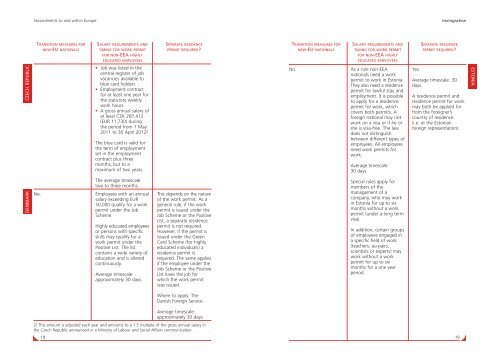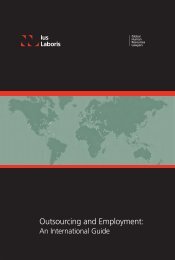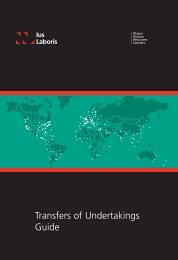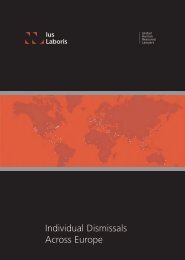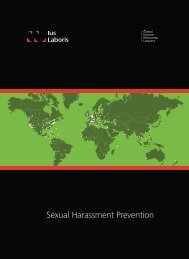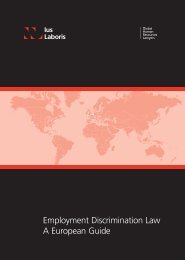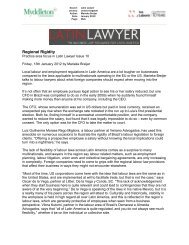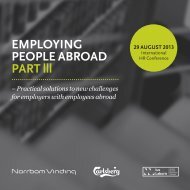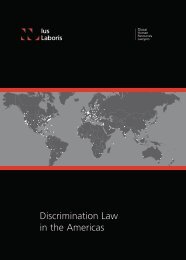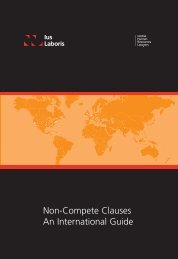Secondments to and within Europe - Ius Laboris
Secondments to and within Europe - Ius Laboris
Secondments to and within Europe - Ius Laboris
You also want an ePaper? Increase the reach of your titles
YUMPU automatically turns print PDFs into web optimized ePapers that Google loves.
<strong>Secondments</strong> <strong>to</strong> <strong>and</strong> <strong>within</strong> <strong>Europe</strong><br />
Immigration<br />
TRANSITION MEASURES FOR<br />
NEW-EU NATIONALS<br />
SALARY REQUIREMENTS AND<br />
TIMING FOR WORK PERMIT<br />
FOR NON-EEA HIGHLY<br />
EDUCATED EMPLOYEES<br />
SEPARATE RESIDENCE<br />
PERMIT REQUIRED?<br />
TRANSITION MEASURES FOR<br />
NEW-EU NATIONALS<br />
SALARY REQUIREMENTS AND<br />
TIMING FOR WORK PERMIT<br />
FOR NON-EEA HIGHLY<br />
EDUCATED EMPLOYEES<br />
SEPARATE RESIDENCE<br />
PERMIT REQUIRED?<br />
CZECH REPUBLIC<br />
• Job was listed in the<br />
central register of job<br />
vacancies available <strong>to</strong><br />
blue card holders<br />
• Employment contract<br />
for at least one year for<br />
the statu<strong>to</strong>ry weekly<br />
work hours<br />
• A gross annual salary of<br />
at least CZK 287,412<br />
(EUR 11,730) during<br />
the period from 1 May<br />
2011 <strong>to</strong> 30 April 2012 2<br />
The blue card is valid for<br />
the term of employment<br />
set in the employment<br />
contract plus three<br />
months, but <strong>to</strong> a<br />
maximum of two years.<br />
No.<br />
As a rule non-EEA<br />
nationals need a work<br />
permit <strong>to</strong> work in Es<strong>to</strong>nia.<br />
They also need a residence<br />
permit for lawful stay <strong>and</strong><br />
employment. It is possible<br />
<strong>to</strong> apply for a residence<br />
permit for work, which<br />
covers both permits. A<br />
foreign national may not<br />
work on a visa or if he or<br />
she is visa-free. The law<br />
does not distinguish<br />
between different types of<br />
employees. All employees<br />
need work permits for<br />
work.<br />
Average timescale:<br />
30 days.<br />
Yes.<br />
Average timescale: 30<br />
days.<br />
A residence permit <strong>and</strong><br />
residence permit for work<br />
may both be applied for<br />
from the foreigner’s<br />
country of residence<br />
(i.e. at the Es<strong>to</strong>nian<br />
foreign representation).<br />
ESTONIA<br />
DENMARK<br />
No.<br />
The average timescale:<br />
two <strong>to</strong> three months.<br />
Employees with an annual<br />
salary exceeding EUR<br />
50,000 qualify for a work<br />
permit under the Job<br />
Scheme.<br />
Highly educated employees<br />
or persons with specific<br />
skills may qualify for a<br />
work permit under the<br />
Positive List. The list<br />
contains a wide variety of<br />
education <strong>and</strong> is altered<br />
continuously.<br />
Average timescale:<br />
approximately 30 days.<br />
This depends on the nature<br />
of the work permit. As a<br />
general rule, if the work<br />
permit is issued under the<br />
Job Scheme or the Positive<br />
List, a separate residence<br />
permit is not required.<br />
However, if the permit is<br />
issued under the Green<br />
Card Scheme (for highly<br />
educated individuals) a<br />
residence permit is<br />
required. The same applies<br />
if the employee under the<br />
Job Scheme or the Positive<br />
List loses the job for<br />
which the work permit<br />
was issued.<br />
Special rules apply for<br />
members of the<br />
management of a<br />
company, who may work<br />
in Es<strong>to</strong>nia for up <strong>to</strong> six<br />
months without a work<br />
permit (under a long term<br />
visa).<br />
In addition, certain groups<br />
of employees engaged in<br />
a specific field of work<br />
(teachers, au-pairs,<br />
scientists or experts) may<br />
work without a work<br />
permit for up <strong>to</strong> six<br />
months for a one year<br />
period.<br />
Where <strong>to</strong> apply: The<br />
Danish Foreign Service.<br />
Average timescale:<br />
approximately 30 days.<br />
2) This amount is adjusted each year <strong>and</strong> amounts <strong>to</strong> a 1.5 multiple of the gross annual salary in<br />
the Czech Republic announced in a Ministry of Labour <strong>and</strong> Social Affairs communication.<br />
18 19


